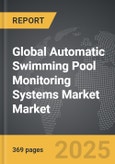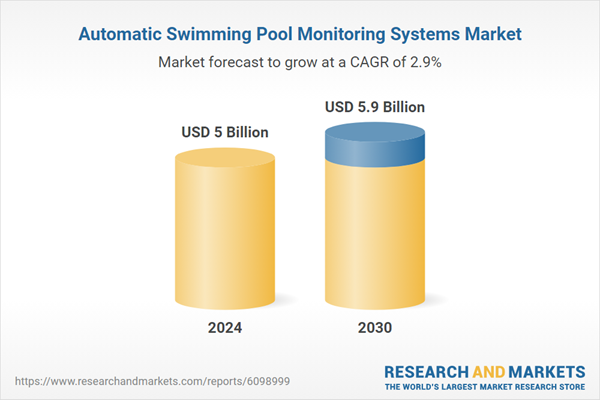Global Automatic Swimming Pool Monitoring Systems Market - Key Trends & Drivers Summarized
Why Are Automatic Swimming Pool Monitoring Systems Becoming Critical to Safety, Hygiene, and Operational Efficiency?
Automatic swimming pool monitoring systems are becoming integral to both public and private aquatic facility management as they address the dual imperatives of health compliance and operational optimization. These systems provide real-time, sensor-based monitoring of key parameters such as chlorine levels, pH balance, temperature, turbidity, and water circulation, enabling precise and timely interventions that maintain water quality within regulatory thresholds. As pool hygiene becomes more tightly scrutinized - particularly in hospitality, community recreation, and healthcare settings - automated systems reduce dependency on manual testing and ensure uninterrupted surveillance of critical chemical and microbial parameters. This shift is particularly valuable in environments with high swimmer turnover, where consistent water sanitation is paramount to preventing outbreaks of waterborne illnesses.Beyond hygiene, these systems are streamlining operations by automating chemical dosing, detecting anomalies, and enabling remote monitoring through cloud platforms or mobile apps. Facility managers gain real-time visibility into system performance and potential equipment malfunctions, reducing the risk of operational downtime or non-compliance penalties. With rising labor shortages and the growing complexity of pool infrastructure - including heating systems, filtration units, and UV sterilization - automated monitoring provides centralized control, improves resource allocation, and supports preventive maintenance scheduling. As a result, pool owners and operators are increasingly adopting these systems as part of broader smart facility strategies that combine safety, efficiency, and cost control.
How Are Advancements in Sensor Technology, IoT Integration, and Predictive Analytics Enhancing the Value Proposition of Pool Monitoring Systems?
Modern automatic pool monitoring systems are leveraging a convergence of technologies - advanced electrochemical sensors, Internet of Things (IoT) frameworks, and AI-driven analytics - to deliver intelligent, real-time water management. These systems continuously analyze chemical concentrations and environmental parameters with high sensitivity and accuracy, detecting deviations from optimal ranges before they escalate into safety hazards. IoT-enabled platforms facilitate remote diagnostics, instant alerts, and automated responses - such as triggering corrective chemical dosing or activating filtration cycles - thereby minimizing human intervention while maximizing reliability and consistency.Predictive analytics further extends functionality by analyzing historical usage data, weather patterns, and seasonal demand trends to forecast maintenance needs, anticipate chemical depletion, and optimize filtration schedules. This reduces operational costs and environmental impact by minimizing chemical overuse and water waste. Integration with building management systems (BMS) and facility automation platforms allows pool systems to synchronize with energy management, HVAC, and occupancy controls, creating energy-efficient, user-responsive environments. In commercial settings, these intelligent systems also support documentation and reporting for regulatory compliance and customer assurance, reinforcing trust and transparency in pool safety and sanitation practices.
Where Is Market Demand for Automatic Pool Monitoring Systems Accelerating and Which Segments Are Leading Adoption?
Demand for automatic swimming pool monitoring systems is rising steadily across residential, commercial, and municipal segments, with the highest momentum observed in hospitality, public recreation, and luxury real estate markets. Hotels, resorts, and theme parks are deploying these systems to meet global hygiene standards, reduce liability exposure, and enhance guest satisfaction through visibly well-maintained aquatic amenities. Municipalities and public health departments are increasingly mandating automated monitoring in public pools to ensure continuous water quality compliance and alleviate the burden of frequent manual inspections.High-end residential properties - especially in North America, Europe, and the Middle East - are also fueling demand for smart pool systems as part of integrated home automation suites. For homeowners, automatic monitoring eliminates the inconvenience of manual testing and offers peace of mind through smartphone-controlled oversight. In regions prone to water scarcity or energy constraints, such as Australia and parts of the U.S. Southwest, adoption is being driven by the ability of these systems to optimize chemical usage and reduce water wastage. Additionally, fitness centers, wellness retreats, and rehabilitation facilities are adopting these systems to uphold stringent hygiene standards and ensure therapeutic water conditions, expanding their relevance beyond recreational use cases.
What Is Fueling the Global Growth of the Automatic Swimming Pool Monitoring Systems Market?
Several converging forces are propelling the expansion of this market, including heightened awareness around public health, tightening sanitation regulations, growing consumer expectations for quality assurance, and widespread digitization across the facility management landscape. The COVID-19 pandemic underscored the importance of hygiene in shared environments, accelerating demand for contactless, automated solutions in recreational and wellness settings. In parallel, urbanization, rising disposable incomes, and increased infrastructure investment in leisure and tourism are creating favorable conditions for pool construction and modernization - further widening the addressable market for automated monitoring solutions.Technological affordability and modular product design are also expanding market accessibility, enabling scalable adoption across facilities of varying sizes and budgets. Partnerships between pool equipment manufacturers, software developers, and facility service providers are driving innovation in integrated offerings that combine monitoring, dosing, cleaning, and compliance reporting. As stakeholders increasingly prioritize sustainability and digital control in facility operations, the question becomes: Can automatic swimming pool monitoring systems evolve into fully autonomous, predictive platforms that not only maintain safety and hygiene but also redefine how aquatic environments are managed in the era of smart infrastructure?
Report Scope
The report analyzes the Automatic Swimming Pool Monitoring Systems market, presented in terms of market value (US$). The analysis covers the key segments and geographic regions outlined below:- Segments: Type (Level Monitoring, Temperature Monitoring, Quality Monitoring); Distribution Channel (Direct Sales, Indirect Sales); End-Use (Residential, Commercial).
- Geographic Regions/Countries: World; United States; Canada; Japan; China; Europe (France; Germany; Italy; United Kingdom; Spain; Russia; and Rest of Europe); Asia-Pacific (Australia; India; South Korea; and Rest of Asia-Pacific); Latin America (Argentina; Brazil; Mexico; and Rest of Latin America); Middle East (Iran; Israel; Saudi Arabia; United Arab Emirates; and Rest of Middle East); and Africa.
Key Insights:
- Market Growth: Understand the significant growth trajectory of the Level Monitoring segment, which is expected to reach US$3.2 Billion by 2030 with a CAGR of a 2.3%. The Temperature Monitoring segment is also set to grow at 3.4% CAGR over the analysis period.
- Regional Analysis: Gain insights into the U.S. market, valued at $1.4 Billion in 2024, and China, forecasted to grow at an impressive 5.4% CAGR to reach $1.2 Billion by 2030. Discover growth trends in other key regions, including Japan, Canada, Germany, and the Asia-Pacific.
Why You Should Buy This Report:
- Detailed Market Analysis: Access a thorough analysis of the Global Automatic Swimming Pool Monitoring Systems Market, covering all major geographic regions and market segments.
- Competitive Insights: Get an overview of the competitive landscape, including the market presence of major players across different geographies.
- Future Trends and Drivers: Understand the key trends and drivers shaping the future of the Global Automatic Swimming Pool Monitoring Systems Market.
- Actionable Insights: Benefit from actionable insights that can help you identify new revenue opportunities and make strategic business decisions.
Key Questions Answered:
- How is the Global Automatic Swimming Pool Monitoring Systems Market expected to evolve by 2030?
- What are the main drivers and restraints affecting the market?
- Which market segments will grow the most over the forecast period?
- How will market shares for different regions and segments change by 2030?
- Who are the leading players in the market, and what are their prospects?
Report Features:
- Comprehensive Market Data: Independent analysis of annual sales and market forecasts in US$ Million from 2024 to 2030.
- In-Depth Regional Analysis: Detailed insights into key markets, including the U.S., China, Japan, Canada, Europe, Asia-Pacific, Latin America, Middle East, and Africa.
- Company Profiles: Coverage of players such as Aebi Schmidt Group, Baiyi Environmental Protection Equipment Co., Ltd., BECO (Bin Qutab Engineering), Boschung Mecatronic AG, Bucher Municipal AG and more.
- Complimentary Updates: Receive free report updates for one year to keep you informed of the latest market developments.
Some of the 42 companies featured in this Automatic Swimming Pool Monitoring Systems market report include:
- Amano
- Aquabot
- B&R Pools and Swim Shop
- Culligan Italiana S.p.A.
- Fluidra S.A.
- Guangzhou Fenlin Swimming Pool & Sauna Equipment Co., Ltd.
- Hayward Industries, Inc.
- iopool
- IPS Controllers
- Jandy (Zodiac Pool Systems)
- Jenco Instruments, Inc.
- LaMotte Company
- Maytronics Ltd.
- Pentair
- pHin (by Hayward)
- Piscines Desjoyaux
- Poolsure (Aquasol Controllers, Inc.)
- ProMinent GmbH
- Riiot Labs
- Safe-T-Cover
This edition integrates the latest global trade and economic shifts into comprehensive market analysis. Key updates include:
- Tariff and Trade Impact: Insights into global tariff negotiations across 180+ countries, with analysis of supply chain turbulence, sourcing disruptions, and geographic realignment. Special focus on 2025 as a pivotal year for trade tensions, including updated perspectives on the Trump-era tariffs.
- Adjusted Forecasts and Analytics: Revised global and regional market forecasts through 2030, incorporating tariff effects, economic uncertainty, and structural changes in globalization. Includes historical analysis from 2015 to 2023.
- Strategic Market Dynamics: Evaluation of revised market prospects, regional outlooks, and key economic indicators such as population and urbanization trends.
- Innovation & Technology Trends: Latest developments in product and process innovation, emerging technologies, and key industry drivers shaping the competitive landscape.
- Competitive Intelligence: Updated global market share estimates for 2025, competitive positioning of major players (Strong/Active/Niche/Trivial), and refined focus on leading global brands and core players.
- Expert Insight & Commentary: Strategic analysis from economists, trade experts, and domain specialists to contextualize market shifts and identify emerging opportunities.
Table of Contents
Companies Mentioned (Partial List)
A selection of companies mentioned in this report includes, but is not limited to:
- Amano
- Aquabot
- B&R Pools and Swim Shop
- Culligan Italiana S.p.A.
- Fluidra S.A.
- Guangzhou Fenlin Swimming Pool & Sauna Equipment Co., Ltd.
- Hayward Industries, Inc.
- iopool
- IPS Controllers
- Jandy (Zodiac Pool Systems)
- Jenco Instruments, Inc.
- LaMotte Company
- Maytronics Ltd.
- Pentair
- pHin (by Hayward)
- Piscines Desjoyaux
- Poolsure (Aquasol Controllers, Inc.)
- ProMinent GmbH
- Riiot Labs
- Safe-T-Cover
Table Information
| Report Attribute | Details |
|---|---|
| No. of Pages | 369 |
| Published | February 2026 |
| Forecast Period | 2024 - 2030 |
| Estimated Market Value ( USD | $ 5 Billion |
| Forecasted Market Value ( USD | $ 5.9 Billion |
| Compound Annual Growth Rate | 2.9% |
| Regions Covered | Global |









